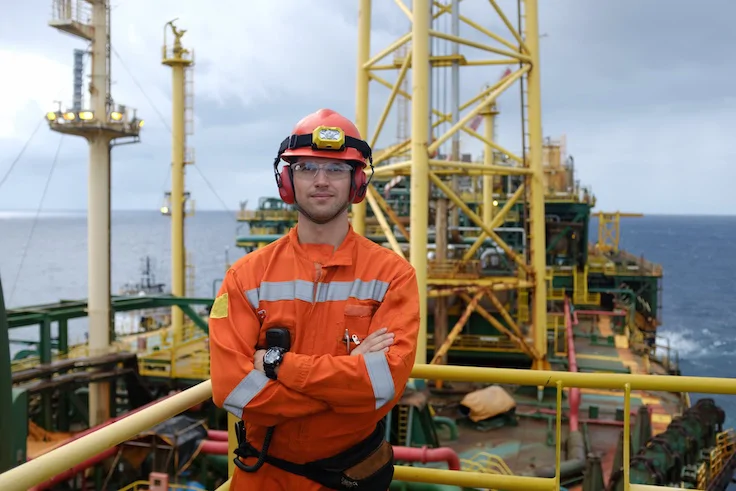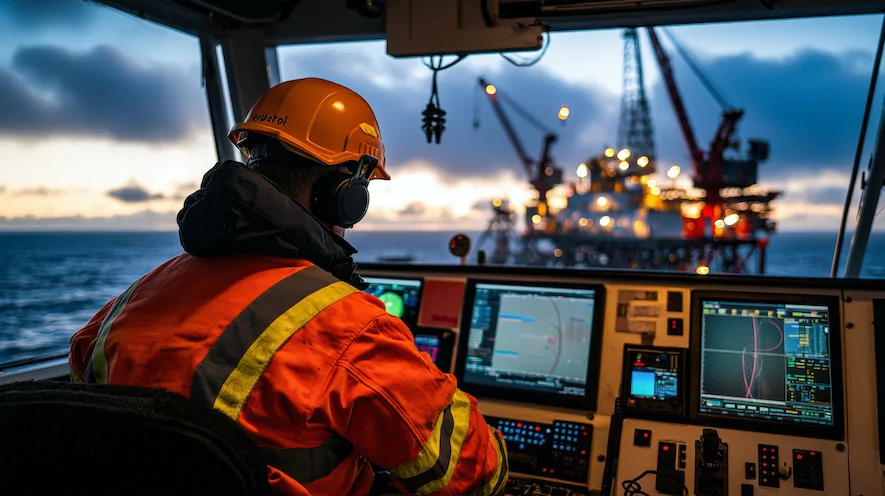Oil and Gas Engineers: Should You Go Offshore or Stay Onshore?
24 Jun, 20257 Minutes
For many engineers in the oil and gas industry, one of the biggest career decisions is whether to work offshore or stay onshore. While the technical responsibilities may overlap, the two paths offer very different working conditions, expectations, and long-term progression routes.
Offshore jobs often come with higher day rates, remote environments, and rotation-based schedules. They appeal to engineers looking for varied experience, strong earning potential, and extended time off. Onshore roles, by contrast, offer more structured working patterns, local stability, and clearer progression for those planning a longer-term career. The good news is that both routes can lead to successful, fulfilling careers.
In this blog, we explore:
- What to expect from offshore roles
- The structure and lifestyle of onshore jobs
- How skills and experience transfer across both
- What to consider before choosing your next move
Orion supports engineers across both career paths. Whether you’re starting out, ready for a change, or looking for roles that align with your goals, we can help you find the right fit in the world of oil and gas jobs.

Working Offshore: What to Expect
Offshore engineering offers a high-pressure, high-reward environment. For many engineers, it can be the fastest way to build hands-on experience, earn competitive day rates, and work on major energy projects worldwide. But offshore jobs are not for everyone. The work is intense, the conditions can be challenging, and the lifestyle is very different from onshore roles.
If you're exploring offshore recruitment opportunities, it's important to understand the full picture before making a move. Here's what to expect across role types, qualifications, work patterns, and the realities of offshore life.
Common offshore engineering roles
Most offshore engineering jobs fall into one of four categories:
- Maintenance engineers who oversee, repair and maintain critical machinery and systems
- Mechanical engineers working on equipment reliability, hydraulic systems and rotating machinery
- Electrical engineers responsible for power systems, motors, and controls
- Instrumentation engineers focused on sensors, measurement systems, and process control
These roles are found on oil rigs, production platforms, FPSOs, and drilling vessels. They are essential to safe, continuous operation and are in demand across multiple global locations.
Offshore working patterns
Rotations are a core part of offshore work. A typical schedule might be two weeks on, two weeks off, although this varies by project and location. While offshore, engineers often work 12-hour shifts, seven days a week. On rotation, you're fully immersed in the job, with limited personal time or connectivity.
This intensity is part of what makes offshore roles appealing. The concentrated work blocks allow for extended leave in between, which some engineers use for travel, study, or family time. However, it requires strong mental resilience and the ability to adapt to life in a close-knit offshore team.
Certifications and compliance
To be eligible for certain offshore jobs, engineers need to meet specific compliance standards. These typically include:
- BOSIET (Basic Offshore Safety Induction and Emergency Training)
- Offshore medical certification proving physical fitness for offshore environments
- Role-specific technical qualifications such as CompEx, HV switching, or API certifications
Some regions also require additional local compliance or travel documentation. Orion regularly advises engineers on certification requirements and can support with guidance on training providers.
What about pay and benefits?
Offshore jobs generally offer higher pay than onshore roles. Uplift allowances are standard and reflect the demands of rotation work, remote environments, and the physical nature of the job.
Most offshore positions include full accommodation, travel, and meals. Some also offer retention or completion bonuses depending on the contract. While exact figures vary by role, location, and company, the overall package tends to be very competitive compared to similar onshore engineering jobs.
Orion works with engineers across all types of offshore recruitment, from permanent roles to short-term contracts. If you're not sure what your experience is worth or what day rate to expect, our team can help benchmark it for you.
Offshore life: the reality
Life offshore is highly structured. Safety protocols are strict, and downtime is limited. Facilities on board vary but usually include shared accommodation, communal dining, and recreational areas.
For many engineers, the focus and rhythm of offshore life is a plus. With fewer distractions and a tight-knit team, it's possible to develop quickly and build valuable experience fast. Others may find the confinement and time away from home difficult to manage long term.
The key is knowing what you're signing up for. Offshore engineering jobs offer exciting challenges, but they require full commitment, adaptability, and the right mindset.

Onshore Engineering: Structure, Stability, and Local Work
Onshore roles appeal to engineers looking for consistency, structured progression, and a more predictable work-life balance. These roles are common across refineries, manufacturing plants, consultancy firms, and wider production support environments. For many, especially those with families or location-based priorities, this route offers long-term value.
Where onshore engineers work
You’ll find onshore roles in:
- Refining and petrochemical plants
- LNG facilities and processing plants
- Engineering consultancy firms
- Midstream and downstream production environments
These jobs form a core part of oil and gas recruitment, with demand steady across the UK and globally.
Common onshore oil and gas jobs:
- Site engineers overseeing upgrades or maintenance work
- Project engineers supporting infrastructure delivery
- Production and process engineers focused on efficiency
- Maintenance engineers ensuring plant reliability
These are key positions in oil and gas engineering jobs, often with a broad technical remit and local base.
Working patterns and lifestyle
Most onshore engineering roles follow weekday shifts, typically Monday to Friday. Some sites may require out-of-hours or weekend cover, but this is planned and predictable. Compared to offshore jobs UK or abroad, onshore work offers more routine and proximity to home.
This lifestyle makes onshore roles ideal for:
- Engineers with family responsibilities
- Mid-career professionals prioritising consistency
- Contractors looking for long-term, location-based work
Pay and progression
While onshore day rates can be lower than offshore, the structure and benefits often provide greater long-term value. Engineers have access to:
- Clear development pathways
- Leadership training and mentoring
- Routes into senior technical or project roles
In oil and gas recruitment, onshore work is often viewed as a stable platform for advancement — particularly in consultancy, manufacturing, or long-running production operations.
Career transitions: offshore to onshore
Many engineers shift between offshore recruitment and onshore roles depending on career stage and personal goals. Offshore experience is valued for its intensity and safety training, and it often leads to:
- Senior contractor or international project roles
- Higher-profile assignments onshore
- Broader credibility across compliance and risk disciplines
At Orion, we help engineers make informed choices at each stage of their careers. Whether you're moving from offshore to onshore or exploring new contract roles, our consultants offer market insight, access to opportunities, and tailored guidance based on your experience.
How to Decide What's Right for You
Choosing between offshore and onshore engineering jobs means thinking carefully about your goals, lifestyle, and what you want from your next role. Both options offer long-term potential in oil and gas jobs, but the experience is very different day to day.
Questions to consider:
- Are you open to rotation schedules and working in remote locations?
- Do you prefer structured progression and steady hours?
- Is pay your main priority, or do you value location and routine?
- Are you early in your career and looking to build hands-on experience?
- Would you rather focus on maintenance, production, or innovation?
If you’re motivated by variety, higher day rates, and time off between rotations, offshore jobs can be a strong fit. They’re intense, often remote, and suit engineers looking to gain rapid project exposure and experience.
If you’re looking for long-term development, stability, and home-based work, onshore engineering roles might be a better option. These roles offer clearer career progression, structured learning, and regular working patterns that align well with personal commitments.
Many professionals move between offshore and onshore at different stages. Some begin offshore for the earnings and early exposure, later shifting to onshore roles for family or lifestyle reasons. Others do the reverse, using onshore experience to step into short-term offshore projects at senior levels.
There’s no one-size-fits-all answer. What matters is knowing what kind of work environment and routine suits you now, and what you want from the next phase of your career in oil and gas engineering jobs.
Find the Right Role for Your Career, Wherever You’re Headed
The decision between offshore and onshore engineering jobs isn’t always straightforward. But when you understand the working patterns, environments, and opportunities in front of you, it becomes easier to choose a path that fits. The oil and gas industry offers variety, challenge, and long-term progression—if you know where to look.
Whether you’re just starting out or planning your next move, the right support makes all the difference.
Looking for Your Next Move in Oil and Gas?
Whether it's offshore recruitment or a new onshore engineering role, Orion has live positions across the UK and internationally. We match candidates to opportunities that align with their experience, ambitions, and lifestyle.



